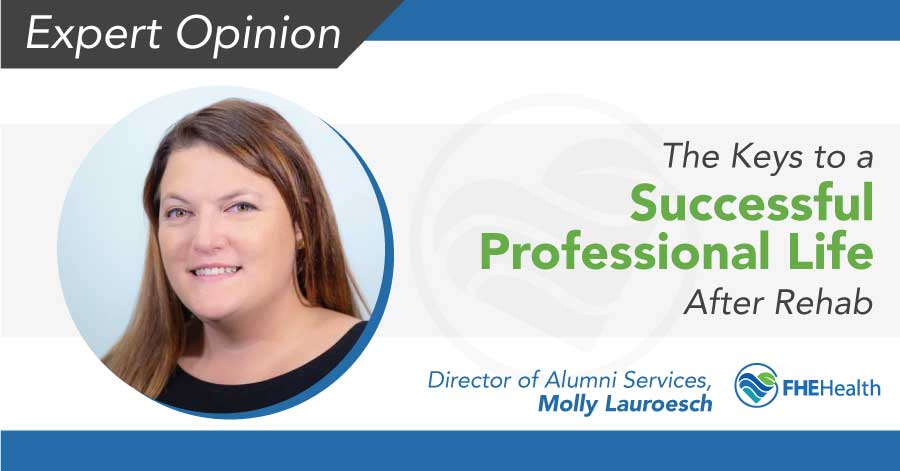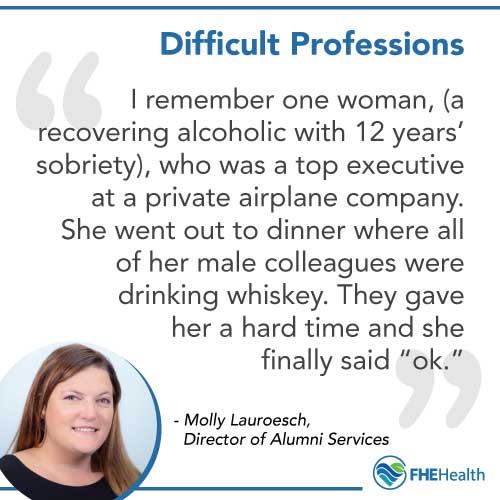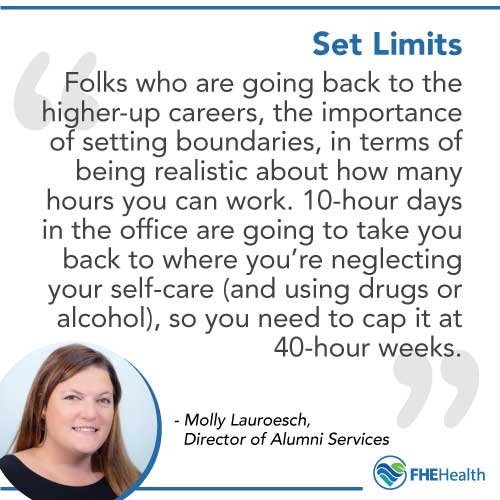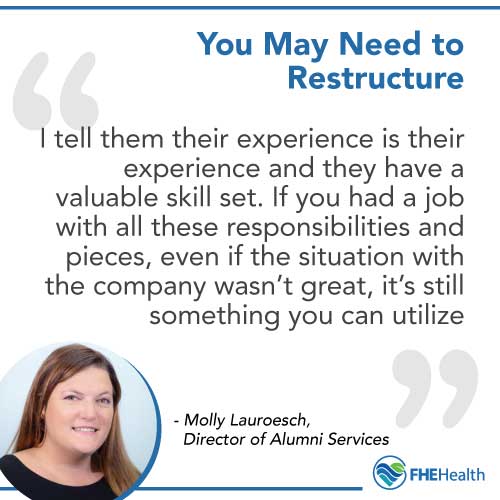
This article has been reviewed for accuracy by our peer review team which includes clinicians and medical professionals. Learn more about our peer review process.
People often wonder whether there’s life after addiction. This can be especially true when drugs or alcohol may have cost them their job, interrupted their education, or ruined their career prospects. The possibility that life can get better—that you can rebuild your career and find professional success—can seem dim at best.
A similar concern can plague those who are considering rehab for a substance use disorder and/or co-occurring mental health condition. They worry that if they take an extended leave of absence from work, or prioritize their health and recovery over their need to make a living, they’ll find themselves unemployed and worse off professionally once rehab is over. (Learn about key laws that can help you keep your job while you go to rehab.)
What to Do After Rehab – and What Not to Do
 Such fears about what to do after drug rehab are understandable. But talk to Molly Lauroesch and you’ll soon discover that they’re (thankfully) misguided. As the director of alumni services at FHE Health, Lauroesch heads up FHE Health’s Resource Center, “which is all about helping people rebuild their careers” after rehab, as she puts it. Much of that work involves building patients’ resumes, assisting them with their job searches, practicing for job interviews, and helping them with their GEDs and other educational resources.
Such fears about what to do after drug rehab are understandable. But talk to Molly Lauroesch and you’ll soon discover that they’re (thankfully) misguided. As the director of alumni services at FHE Health, Lauroesch heads up FHE Health’s Resource Center, “which is all about helping people rebuild their careers” after rehab, as she puts it. Much of that work involves building patients’ resumes, assisting them with their job searches, practicing for job interviews, and helping them with their GEDs and other educational resources.
Because Lauroesch keeps a close and open line of communication with former FHE Health patients and soon-to-be-former patients, she is intimately familiar with the challenges of recovery after rehab and how these pertain to finding a job and succeeding in it. Lauoresch can also say with authority that many of our patients go directly from rehab into new jobs or vocational pursuits, and from there— go on to discover successful and rewarding professional lives.
Avoid job sectors that are more prone to drug and alcohol use.
But the unique nature of recovery after rehab means that some job settings are better than others for people who have just completed treatment for drug or alcohol addiction, as Lauroesch observed: “Something I’ve noticed with patients who are working a recovery program—one common thing I hear—is that in the sales and entertainment sectors, it can be very difficult to avoid drinking in those situations.”
If sales and entertainment jobs may be tougher on a recovery lifestyle than others, Lauroesch noted that “the pressure within certain businesses can be especially difficult on the alcohol front,” given the legal and ready availability of alcohol and its frequent prevalence at happy hours, holiday parties and other office occasions:
I remember one woman, (a recovering alcoholic with 12 years’ sobriety), who was a top executive at a private airplane company. She went out to dinner where all of her male colleagues were drinking whiskey. They gave her a hard time and she finally said “ok.”
Take measures to protect yourself from high-risk situations.

If you have to be in one of these less recovery-friendly jobs, such as sales or entertainment, do what you can to take measures to protect yourself from being in high-risk situations where alcohol is on offer, Lauroesch advised. She gave the example of one patient, a recovering alcoholic, who is going back to his job in sales: “He’s going to delegate supervisory situations to avoid the trap of having to drink in these social business settings.”
How to help an alcoholic after rehab? Find them “a job that’s more sobriety-inclined.”
Lauroesch noted that many young people—who in addition to being in early recovery are also early-career members of the workforce—are intentional about finding jobs that are friendlier to their recovery. “Instead of taking that job as a waiter at a nightclub, for example, you might take a job waiting on tables at Cracker Barrel instead,” she said.
Don’t go back into a high-stress job that will tempt you to use again.
Like the female executive whose relapse trigger was alcohol, other high-functioning people may be predisposed to use stimulants and/or benzos or opiates—even marijuana—in order to cope with busy schedules, long hours and high-stress positions. For example, Lauroesch recalled one patient who worked at a tech company who said his days were “always so overwhelming and stressful that as soon as he got home he would smoke marijuana.”
Prioritize your self-care, by working no more than 40 hours/week.
With these “folks who are going back to the higher-up careers,” Lauroesch said she encourages “the importance of setting boundaries, in terms of being realistic about how many hours you can work. 10-hour days in the office are going to take you back to where you’re neglecting your self-care (and using drugs or alcohol), so you need to cap it at 40-hour weeks.” Lauroesch added that people “don’t necessarily want to lose these careers they’ve built, but it’s critical for them to prioritize self-care.”
Other Tips for Rebuilding Your Professional Life in Recovery After Rehab
 Many patients come to Lauroesch feeling afraid about finding a job after rehab because they “burned bridges,” having been fired while high or because of another drug or alcohol-related infraction on the job. In these cases, Lauroesch is sanguine with patients. She lets them know that while their resume may have taken a hit, it’s also a temporary one: “I tell them their experience is their experience and they have a valuable skill set. If you had a job with all these responsibilities and pieces, even if the situation with the company wasn’t great, it’s still something you can utilize.”
Many patients come to Lauroesch feeling afraid about finding a job after rehab because they “burned bridges,” having been fired while high or because of another drug or alcohol-related infraction on the job. In these cases, Lauroesch is sanguine with patients. She lets them know that while their resume may have taken a hit, it’s also a temporary one: “I tell them their experience is their experience and they have a valuable skill set. If you had a job with all these responsibilities and pieces, even if the situation with the company wasn’t great, it’s still something you can utilize.”
Another critical part of recovery after rehab, according to Lauroesch, is having an aftercare plan that should include:
- A feasible plan for dealing with your relapse triggers when they arise
- Regular participation in a home 12-step group
- Ongoing weekly individual therapy
- Good sleep habits
- Healthy nutrition and regular exercise
Job-Friendly Skills Acquired in Rehab
What many people considering rehab also don’t know is that many of the skills learned there are transferable to the job world. Here are some of the employer-friendly skills that Lauroesch said you can expect to learn in rehab:
- Self-awareness – Greater self-understanding when it comes to knowing why you respond to certain situations in the way that you do
- Healthy thinking – Rehab can teach you about your “cognitive distortions” (the negative thoughts that trigger self-defeating behaviors like substance abuse) and how to retrain your mind and thoughts; for example, “if you get feedback from your boss, you might ruminate about your failures all day,” Lauroesch said. With the cognitive behavioral therapy (CBT) that you get in rehab, you can reframe these negative thoughts into healthier ways of thinking that improve how you relate to your boss and coworkers.
- Anger management – Anger is a very common relapse trigger, but in rehab you develop tools for “handling your frustration with a boss or coworker” and for reframing the situation.
- Communication skills – In rehab, you also learn how to communicate in healthier ways that forge a greater connection with others in times of stress or misunderstanding … and what employer doesn’t want an employee who can communicate well with their coworkers and management?






